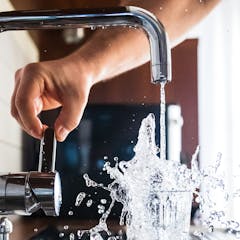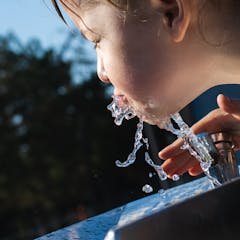
Articles on Safe drinking water
Displaying 1 - 20 of 23 articles

It is difficult and expensive to effectively remove ‘forever chemicals’ from your drinking water at home. And you also don’t want to get rid of the health-giving minerals water contains.

Filtering out PFAS is only the first step. These ‘forever chemicals’ still have to be destroyed, and there are many questions about how to do that safely.

There are a lot of myths and strongly held beliefs around one of life’s simplest activities – drinking water.

Our research shows the world is not on track to achieve any of the Sustainable Development Goals. But with decisive action, we can still achieve a fairer, more sustainable and prosperous future.

The action by the Environment Protection Authority follows alarming results from testing of rainwater tanks and the blood and hair of residents living near to the mine.

The current cholera outbreak is not necessarily an issue with potable water. It’s the result of a combination of factors including dysfunctional and non-compliant wastewater treatment works.

The bottled water industry can undermine progress of projects aimed at creating safe-water systems for all, by redirecting attention to a less reliable, less affordable option.

Every household is more likely than not to have dusts containing PFAS chemicals at low concentrations. But how worried should we be about the risks to our personal health?

Water sharing arrangements have the potential to enhance water security, but they require strong communication and co-ordination between community leaders in addition to adequate financial support.

If you’re on holidays, the water may taste different. But is it safe to drink?

A new report finds tap water in more than 500 remote Indigenous communities isn’t regularly tested. But here’s why this isn’t news to us.

To fully implement the UN Declaration on the Rights of Indigenous Peoples, Canada must engage in genuine and inclusive law reform.

Drinkable water resources are becoming increasingly scarce. Are technologies such as desalination capable of averting such a crisis?

Water is a critical resource, enabling socio-economic development.

Ironically, excess rain can lead to a shortage of clean drinking water in times of storms and flooding.

It will cost tens of billions of dollars to find and remove all the lead service lines that deliver water to US homes and schools. A public health expert explains why he sees it as money well spent.

President Biden has proposed spending $45 billion to replace every lead water pipe and service line in the nation. A public health expert explains why he sees this as a worthwhile investment.

The federal government’s announcement that boil-water advisories on First Nations won’t end until 2023 at the earliest isn’t surprising. The true crisis is much greater than widely known.

A tax on sugar-sweetened beverages may be intended to improve health, but for Indigenous consumers, such a tax would be unethical, contravene tax law and undermine Indigenous rights.

The federal government’s focus on eliminating long-term drinking-water advisories diverts attention from other water-related issues.
